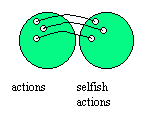Again, if every act sentient being acts from their self (as they must), the action must be selfish in some regard, so we return to the tautological problem on the definition of selfishness above.
The issue I have here and with all the linked stuff so far is that all these arguments are based on an either/or scenario. Either any amount of selfishness counts as the whole act being selfish(tautological problem), or someone subjectively decides how much selfishness in an act is enough to call it one or the other. Notice how no one argues that there is no selfish element? They only argue that the selfish elements are so negligible that the whole act can be called non-selfish.
The egoist says every action is selfish because every action has some aspect of selfishness in it. The opponent of the egoist says some things with selfishness in them are still non selfish acts. I say my argument stands in the face of both these views.
This latest source you quoted is much stronger in the argument, but still argues a separate argument than my premise. It still attaches the meaning of the word selfish to the whole of the act, therefore negating its use on partially selfish acts (that are deemed by someone to be mostly non selfish.)
I think it comes down to semantics. The word selfish is a word that comes across so strong in most minds that it encompasses the whole act as a general use of the word. If there was a word that would illustrate a lesser degree of selfishness in an act without labeling the act as selfish or non selfish then I would use that word.
I was very specific on how I worded the original post to reflect that I wasn't labeling any act as selfish or non selfish. Only that there is no act (in my mind) that can be without selfishness.
from the OP
Every single thing that a human does has some selfishness in it. There is no such thing as a fully non selfish act. If you can think of one post it here and I will explain how there is at least a tiny bit of selfishness in it.
The purpose of this statement wasn't to show that all acts should be called selfish because there is selfishness in them. The purpose was to illustrate that selfishness is a driving force in humans that help shape our definitions of good and evil. (in the absence of a higher power we believe in defining good and evil for us.)
In fact, most if not all of the arguments for non-selfish or altruistic acts state there is "selfish motivations" or "slightly selfish acts" embedded in these non-selfish acts. This actually is completely in line with my line of reasoning. Almost word for word.
quote from the most recent source
These definitions make it clear that if you genuinely want to help other people, then acting on that desire is selfless, not selfish. Sure, you're doing what you want (in a sense), but since what you want is admirably altruistic, so is the resulting action.
Bolding is emphasis by me.
the whole act is altruistic, but there is a selfish element.
and from the first source
- Following the maxim, then, "when in difficulty, make a distinction," we can distinguish between "selfishness" and "non-selfishness" by looking at the object of the want in the action of an individual.
1. If I want something for myself, the action is selfish.
2. If I want something for someone else, then even if it gives me pleasure, the act is not selfish.
- After all, as Rachels writes, isn't the unselfish person precisely the one who derives satisfaction from helping others? The selfish person would be the one who helps grudgingly.
again, bolding by me for emphasis.
I would argue getting what you want and deriving satisfaction are selfish motivations. Those motivations do not make the whole act a selfish one like the egoists argue. They are a part of the whole which I have been arguing.[DOUBLEPOST=1372834085,1372834016][/DOUBLEPOST]
Passing out when getting hit by someone else.
passing out is not an act, its a reaction. The person hitting is surely doing it for selfish reasons like he wanted to and damn the consequences.













